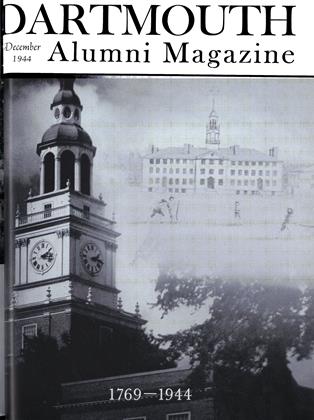IT HAPPENS THAT THIS issue of the ALUMNI MAGAZINE coincides in date almost exactly with the anniversary of the grant of the original charter, from King George III through Governor John Wentworth, 175 years ago. That document was confirmed on December 18, 1769, establishing Dartmouth College. It is interesting to note in passing that the Indian school from which the college developed was also December's child; for it was on December 18, 1754 that Eleazar Wheelock first opened his home in Lebanon, Connecticut, for the evangelizing of Indians. Thus the 18 th day of the twelfth month seems to possess an unusual significance for Dartmouth; and in the present year it marks not only the 175 th anniversary of the charter, but also the 190 th anniversary of the planting of the tiny seed from which the College sprang.
Something in the human make-up inclines mankind to pay reverence to imaginary lines and to recurrent anniversariesespecially to such as mark the 25th, 50th, 75th. and 100 th years. Conceivably the importance of such multiples of five is exaggerated, but it makes for convenience and above all it seems to be a natural propensity. It is fitting to take at least passing notice of the completion of 175 years of service, though wartime conditions preclude the sort of ceremonies which marked the sesquicentennial and will presumably mark the bicentennial in 1969. It is fitting, not merely as a source of pride in the record already made, but also and more im portantly as a source of inspiration for the years that are to come. Dartmouth has had, to date, eleven presidents, of whom three served for notably extended terms. The second, John Wheelock, held the position for 36 years; Nathan Lord for 35; Ernest Martin Hopkins has already served for 28 —and may he equal, or better still exceed, the longest previous record, both in years and in achievement. It has been his happy lot to see the seed which Eleazar planted bring forth fruit beyond the dream of both the makers of the Old Dartmouth and the makers of the New, and to know that it is his honest right to say (what he is much too modest to assert), "Quorum pars magnafui."
 View Full Issue
View Full Issue
More From This Issue
-
 Article
ArticleTHE FOUNDING FAITH
December 1944 By EARL CRANSTON '16, PHILLIPS PROFESSOR OF RELIGION -
 Article
ArticleTHE FIRST 175 YEARS
December 1944 -
 Lettter from the Editor
Lettter from the Editor'Round the Girdled Earth
December 1944 By H. F. W. -
 Class Notes
Class Notes1934
December 1944 By WILLIAM C. EMBRY -
 Class Notes
Class Notes1945
December 1944 By ARTHUR NICHOLS -
 Article
ArticleDARTMOUTH'S CHARTER
December 1944







